Professional Ethics in the Finance Sector: A Clydesdale Bank Report
VerifiedAdded on 2020/12/09
|12
|4062
|82
Report
AI Summary
This report provides a comprehensive analysis of professional ethics within the finance sector, using Clydesdale Bank as a case study. It begins by defining professional ethics and its significance, then explores key principles such as integrity, objectivity, and confidentiality. The report examines legal, regulatory, and ethical requirements affecting the accounting and finance sector, including compliance and codes of practice. It highlights the role of professional bodies in monitoring ethical conduct. Furthermore, the report discusses the expectations for operating a business within a code of conduct and practice, the risks of improper practices, and the importance of maintaining up-to-date knowledge. The report also covers ethical conduct with clients, suppliers, and colleagues, emphasizing objectivity and professional distance. It explores the importance of adhering to organizational values, codes of ethics, and regulations, and the handling of client monies. The report concludes by examining strategies for preventing ethical conflicts and promoting an ethical approach to sustainability. The report also discusses relevant authorities and internal departments to which unethical behavior and breaches of confidentiality should be reported. It also covers the actions to be taken in instances when requests for work are beyond the employee’s competence. Lastly, the report identifies inappropriate client behavior and how to report it and outlines the internal and external procedures to be followed for stopping illegal and unethical practices.
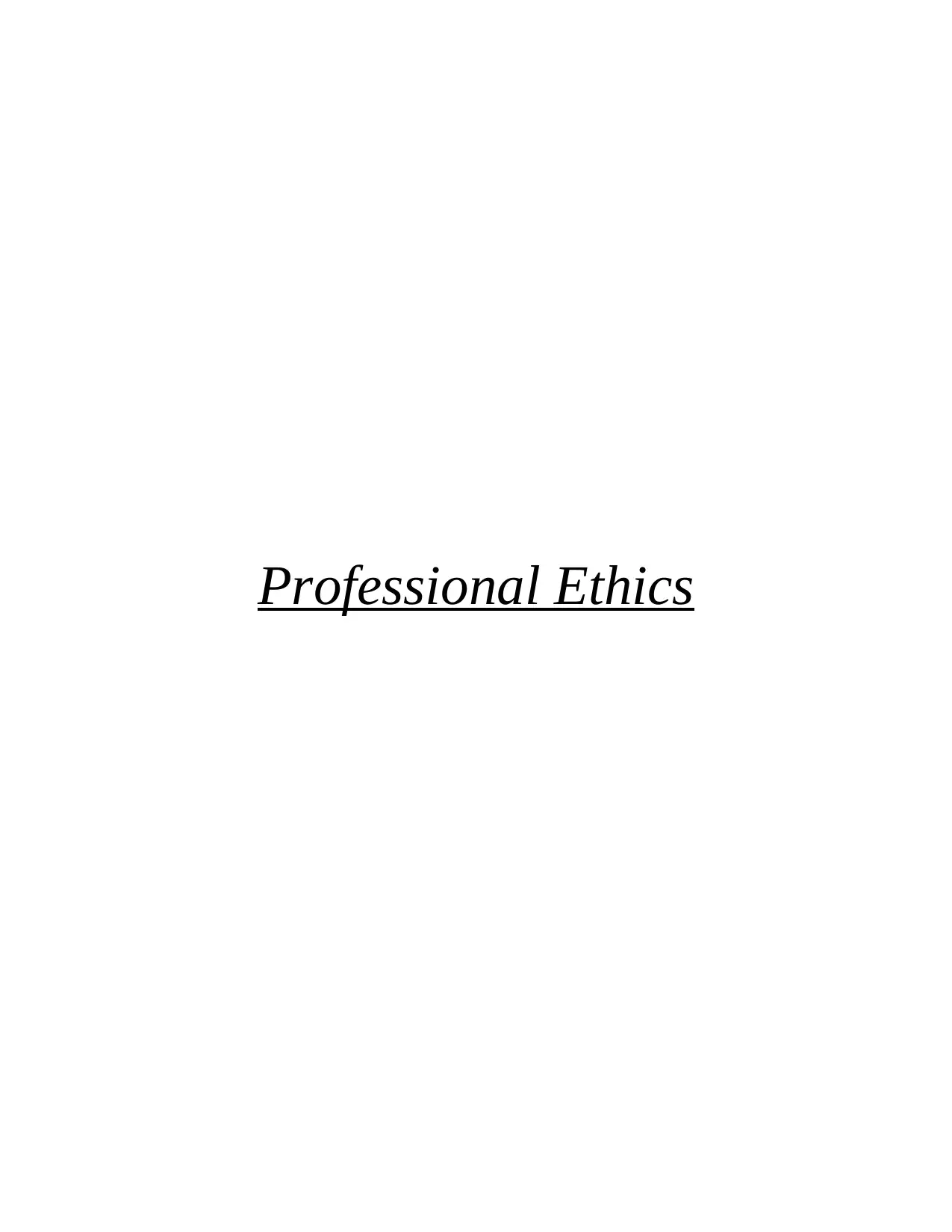
Professional Ethics
Paraphrase This Document
Need a fresh take? Get an instant paraphrase of this document with our AI Paraphraser
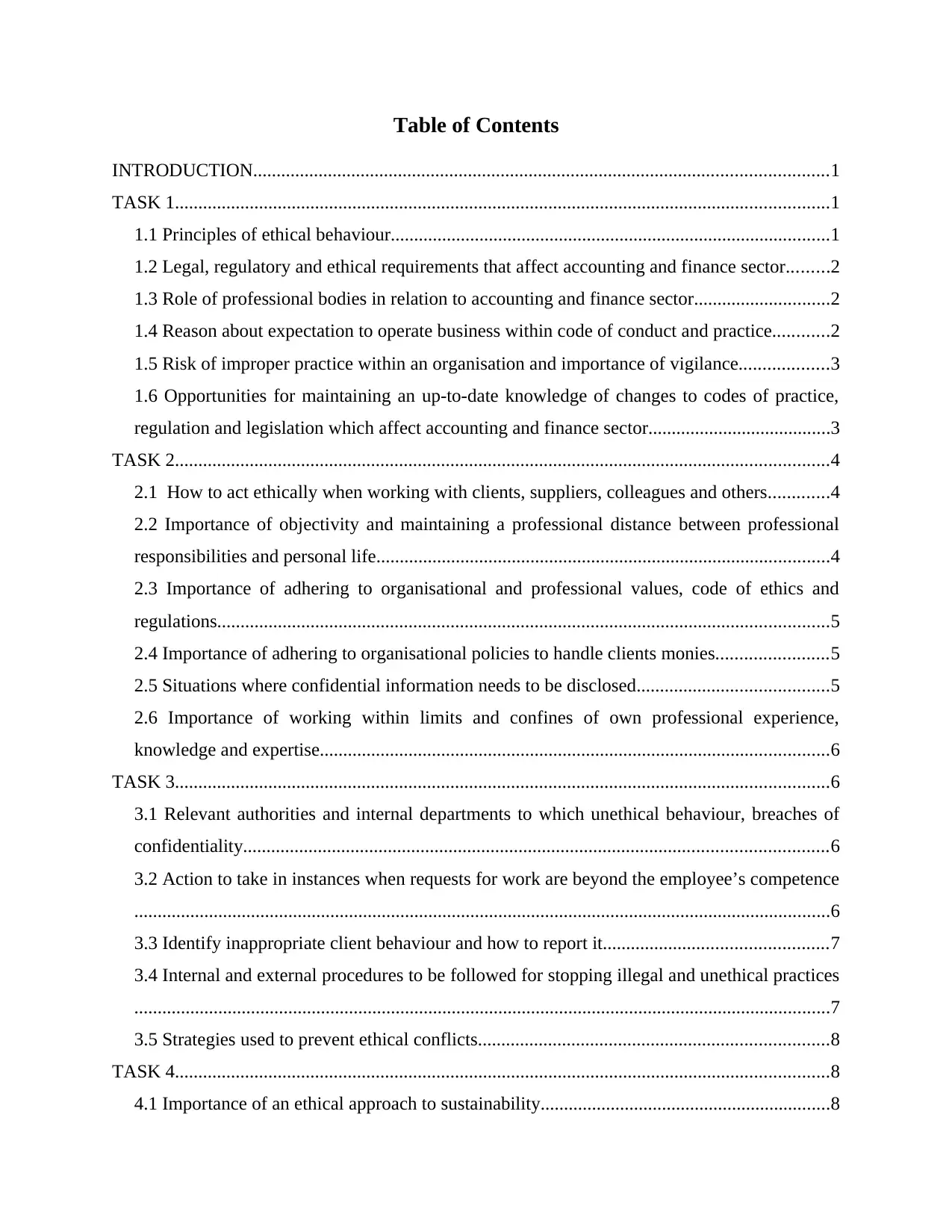
Table of Contents
INTRODUCTION...........................................................................................................................1
TASK 1............................................................................................................................................1
1.1 Principles of ethical behaviour..............................................................................................1
1.2 Legal, regulatory and ethical requirements that affect accounting and finance sector.........2
1.3 Role of professional bodies in relation to accounting and finance sector.............................2
1.4 Reason about expectation to operate business within code of conduct and practice............2
1.5 Risk of improper practice within an organisation and importance of vigilance...................3
1.6 Opportunities for maintaining an up-to-date knowledge of changes to codes of practice,
regulation and legislation which affect accounting and finance sector.......................................3
TASK 2............................................................................................................................................4
2.1 How to act ethically when working with clients, suppliers, colleagues and others.............4
2.2 Importance of objectivity and maintaining a professional distance between professional
responsibilities and personal life.................................................................................................4
2.3 Importance of adhering to organisational and professional values, code of ethics and
regulations...................................................................................................................................5
2.4 Importance of adhering to organisational policies to handle clients monies........................5
2.5 Situations where confidential information needs to be disclosed.........................................5
2.6 Importance of working within limits and confines of own professional experience,
knowledge and expertise.............................................................................................................6
TASK 3............................................................................................................................................6
3.1 Relevant authorities and internal departments to which unethical behaviour, breaches of
confidentiality.............................................................................................................................6
3.2 Action to take in instances when requests for work are beyond the employee’s competence
.....................................................................................................................................................6
3.3 Identify inappropriate client behaviour and how to report it................................................7
3.4 Internal and external procedures to be followed for stopping illegal and unethical practices
.....................................................................................................................................................7
3.5 Strategies used to prevent ethical conflicts...........................................................................8
TASK 4............................................................................................................................................8
4.1 Importance of an ethical approach to sustainability..............................................................8
INTRODUCTION...........................................................................................................................1
TASK 1............................................................................................................................................1
1.1 Principles of ethical behaviour..............................................................................................1
1.2 Legal, regulatory and ethical requirements that affect accounting and finance sector.........2
1.3 Role of professional bodies in relation to accounting and finance sector.............................2
1.4 Reason about expectation to operate business within code of conduct and practice............2
1.5 Risk of improper practice within an organisation and importance of vigilance...................3
1.6 Opportunities for maintaining an up-to-date knowledge of changes to codes of practice,
regulation and legislation which affect accounting and finance sector.......................................3
TASK 2............................................................................................................................................4
2.1 How to act ethically when working with clients, suppliers, colleagues and others.............4
2.2 Importance of objectivity and maintaining a professional distance between professional
responsibilities and personal life.................................................................................................4
2.3 Importance of adhering to organisational and professional values, code of ethics and
regulations...................................................................................................................................5
2.4 Importance of adhering to organisational policies to handle clients monies........................5
2.5 Situations where confidential information needs to be disclosed.........................................5
2.6 Importance of working within limits and confines of own professional experience,
knowledge and expertise.............................................................................................................6
TASK 3............................................................................................................................................6
3.1 Relevant authorities and internal departments to which unethical behaviour, breaches of
confidentiality.............................................................................................................................6
3.2 Action to take in instances when requests for work are beyond the employee’s competence
.....................................................................................................................................................6
3.3 Identify inappropriate client behaviour and how to report it................................................7
3.4 Internal and external procedures to be followed for stopping illegal and unethical practices
.....................................................................................................................................................7
3.5 Strategies used to prevent ethical conflicts...........................................................................8
TASK 4............................................................................................................................................8
4.1 Importance of an ethical approach to sustainability..............................................................8
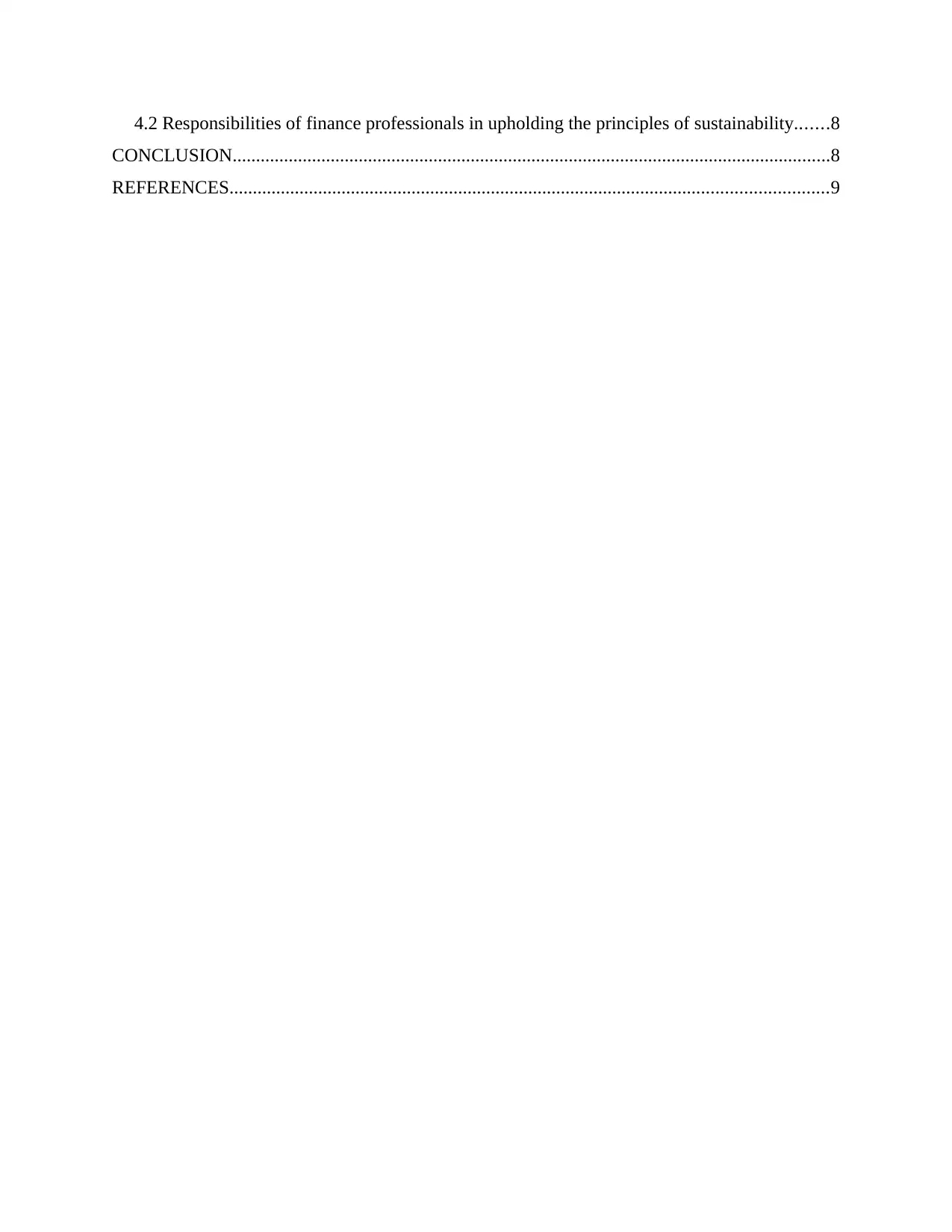
4.2 Responsibilities of finance professionals in upholding the principles of sustainability.......8
CONCLUSION................................................................................................................................8
REFERENCES................................................................................................................................9
CONCLUSION................................................................................................................................8
REFERENCES................................................................................................................................9
⊘ This is a preview!⊘
Do you want full access?
Subscribe today to unlock all pages.

Trusted by 1+ million students worldwide
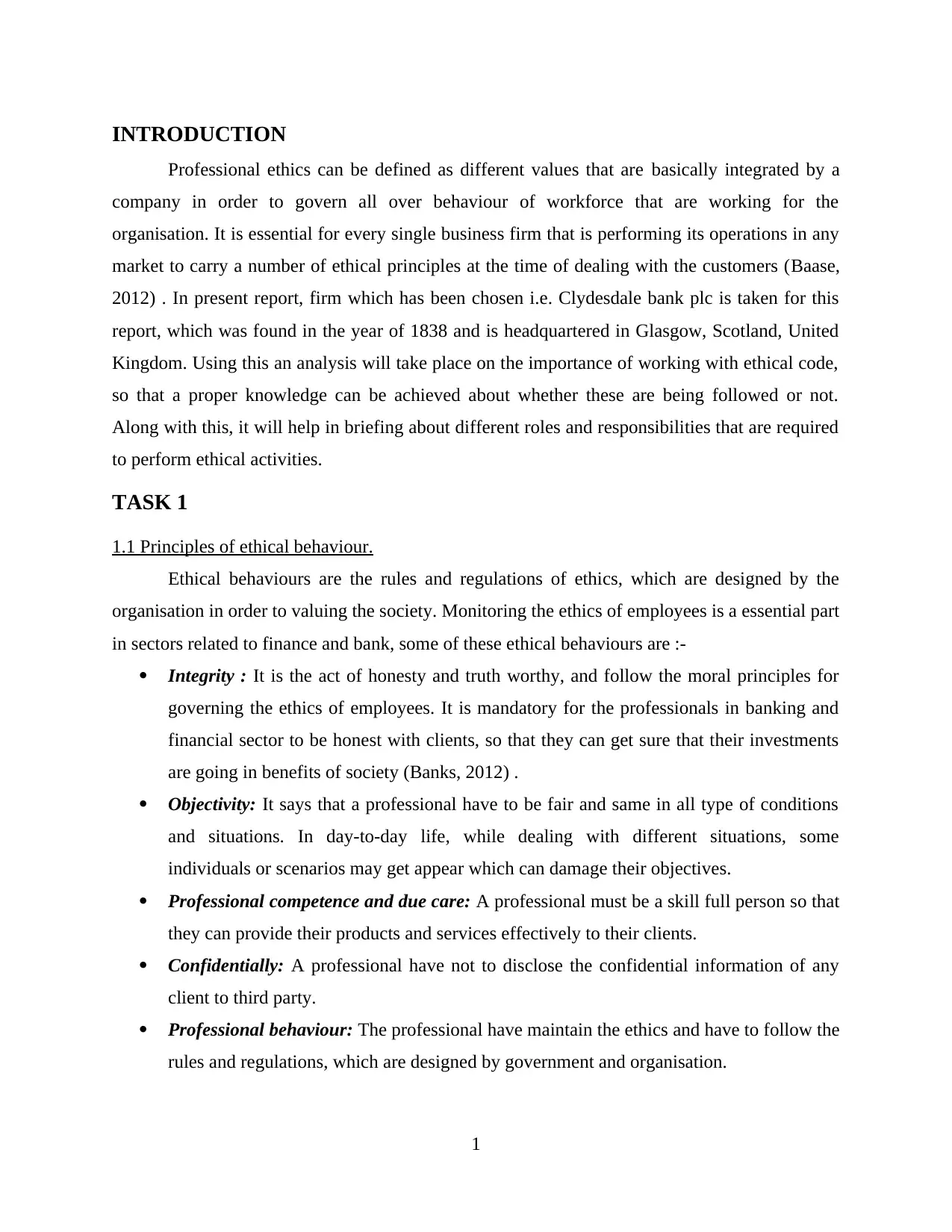
INTRODUCTION
Professional ethics can be defined as different values that are basically integrated by a
company in order to govern all over behaviour of workforce that are working for the
organisation. It is essential for every single business firm that is performing its operations in any
market to carry a number of ethical principles at the time of dealing with the customers (Baase,
2012) . In present report, firm which has been chosen i.e. Clydesdale bank plc is taken for this
report, which was found in the year of 1838 and is headquartered in Glasgow, Scotland, United
Kingdom. Using this an analysis will take place on the importance of working with ethical code,
so that a proper knowledge can be achieved about whether these are being followed or not.
Along with this, it will help in briefing about different roles and responsibilities that are required
to perform ethical activities.
TASK 1
1.1 Principles of ethical behaviour.
Ethical behaviours are the rules and regulations of ethics, which are designed by the
organisation in order to valuing the society. Monitoring the ethics of employees is a essential part
in sectors related to finance and bank, some of these ethical behaviours are :-
Integrity : It is the act of honesty and truth worthy, and follow the moral principles for
governing the ethics of employees. It is mandatory for the professionals in banking and
financial sector to be honest with clients, so that they can get sure that their investments
are going in benefits of society (Banks, 2012) .
Objectivity: It says that a professional have to be fair and same in all type of conditions
and situations. In day-to-day life, while dealing with different situations, some
individuals or scenarios may get appear which can damage their objectives.
Professional competence and due care: A professional must be a skill full person so that
they can provide their products and services effectively to their clients.
Confidentially: A professional have not to disclose the confidential information of any
client to third party.
Professional behaviour: The professional have maintain the ethics and have to follow the
rules and regulations, which are designed by government and organisation.
1
Professional ethics can be defined as different values that are basically integrated by a
company in order to govern all over behaviour of workforce that are working for the
organisation. It is essential for every single business firm that is performing its operations in any
market to carry a number of ethical principles at the time of dealing with the customers (Baase,
2012) . In present report, firm which has been chosen i.e. Clydesdale bank plc is taken for this
report, which was found in the year of 1838 and is headquartered in Glasgow, Scotland, United
Kingdom. Using this an analysis will take place on the importance of working with ethical code,
so that a proper knowledge can be achieved about whether these are being followed or not.
Along with this, it will help in briefing about different roles and responsibilities that are required
to perform ethical activities.
TASK 1
1.1 Principles of ethical behaviour.
Ethical behaviours are the rules and regulations of ethics, which are designed by the
organisation in order to valuing the society. Monitoring the ethics of employees is a essential part
in sectors related to finance and bank, some of these ethical behaviours are :-
Integrity : It is the act of honesty and truth worthy, and follow the moral principles for
governing the ethics of employees. It is mandatory for the professionals in banking and
financial sector to be honest with clients, so that they can get sure that their investments
are going in benefits of society (Banks, 2012) .
Objectivity: It says that a professional have to be fair and same in all type of conditions
and situations. In day-to-day life, while dealing with different situations, some
individuals or scenarios may get appear which can damage their objectives.
Professional competence and due care: A professional must be a skill full person so that
they can provide their products and services effectively to their clients.
Confidentially: A professional have not to disclose the confidential information of any
client to third party.
Professional behaviour: The professional have maintain the ethics and have to follow the
rules and regulations, which are designed by government and organisation.
1
Paraphrase This Document
Need a fresh take? Get an instant paraphrase of this document with our AI Paraphraser
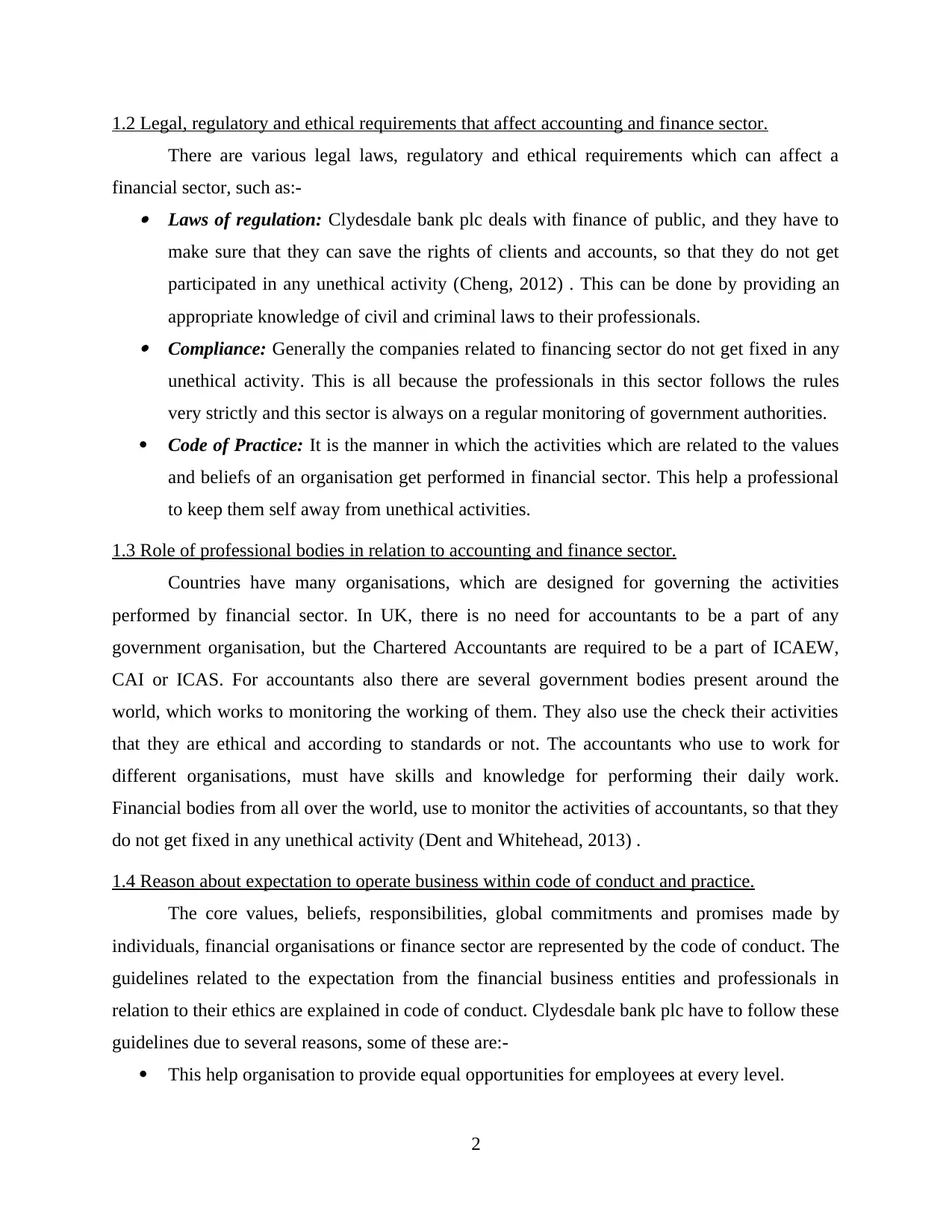
1.2 Legal, regulatory and ethical requirements that affect accounting and finance sector.
There are various legal laws, regulatory and ethical requirements which can affect a
financial sector, such as:- Laws of regulation: Clydesdale bank plc deals with finance of public, and they have to
make sure that they can save the rights of clients and accounts, so that they do not get
participated in any unethical activity (Cheng, 2012) . This can be done by providing an
appropriate knowledge of civil and criminal laws to their professionals. Compliance: Generally the companies related to financing sector do not get fixed in any
unethical activity. This is all because the professionals in this sector follows the rules
very strictly and this sector is always on a regular monitoring of government authorities.
Code of Practice: It is the manner in which the activities which are related to the values
and beliefs of an organisation get performed in financial sector. This help a professional
to keep them self away from unethical activities.
1.3 Role of professional bodies in relation to accounting and finance sector.
Countries have many organisations, which are designed for governing the activities
performed by financial sector. In UK, there is no need for accountants to be a part of any
government organisation, but the Chartered Accountants are required to be a part of ICAEW,
CAI or ICAS. For accountants also there are several government bodies present around the
world, which works to monitoring the working of them. They also use the check their activities
that they are ethical and according to standards or not. The accountants who use to work for
different organisations, must have skills and knowledge for performing their daily work.
Financial bodies from all over the world, use to monitor the activities of accountants, so that they
do not get fixed in any unethical activity (Dent and Whitehead, 2013) .
1.4 Reason about expectation to operate business within code of conduct and practice.
The core values, beliefs, responsibilities, global commitments and promises made by
individuals, financial organisations or finance sector are represented by the code of conduct. The
guidelines related to the expectation from the financial business entities and professionals in
relation to their ethics are explained in code of conduct. Clydesdale bank plc have to follow these
guidelines due to several reasons, some of these are:-
This help organisation to provide equal opportunities for employees at every level.
2
There are various legal laws, regulatory and ethical requirements which can affect a
financial sector, such as:- Laws of regulation: Clydesdale bank plc deals with finance of public, and they have to
make sure that they can save the rights of clients and accounts, so that they do not get
participated in any unethical activity (Cheng, 2012) . This can be done by providing an
appropriate knowledge of civil and criminal laws to their professionals. Compliance: Generally the companies related to financing sector do not get fixed in any
unethical activity. This is all because the professionals in this sector follows the rules
very strictly and this sector is always on a regular monitoring of government authorities.
Code of Practice: It is the manner in which the activities which are related to the values
and beliefs of an organisation get performed in financial sector. This help a professional
to keep them self away from unethical activities.
1.3 Role of professional bodies in relation to accounting and finance sector.
Countries have many organisations, which are designed for governing the activities
performed by financial sector. In UK, there is no need for accountants to be a part of any
government organisation, but the Chartered Accountants are required to be a part of ICAEW,
CAI or ICAS. For accountants also there are several government bodies present around the
world, which works to monitoring the working of them. They also use the check their activities
that they are ethical and according to standards or not. The accountants who use to work for
different organisations, must have skills and knowledge for performing their daily work.
Financial bodies from all over the world, use to monitor the activities of accountants, so that they
do not get fixed in any unethical activity (Dent and Whitehead, 2013) .
1.4 Reason about expectation to operate business within code of conduct and practice.
The core values, beliefs, responsibilities, global commitments and promises made by
individuals, financial organisations or finance sector are represented by the code of conduct. The
guidelines related to the expectation from the financial business entities and professionals in
relation to their ethics are explained in code of conduct. Clydesdale bank plc have to follow these
guidelines due to several reasons, some of these are:-
This help organisation to provide equal opportunities for employees at every level.
2
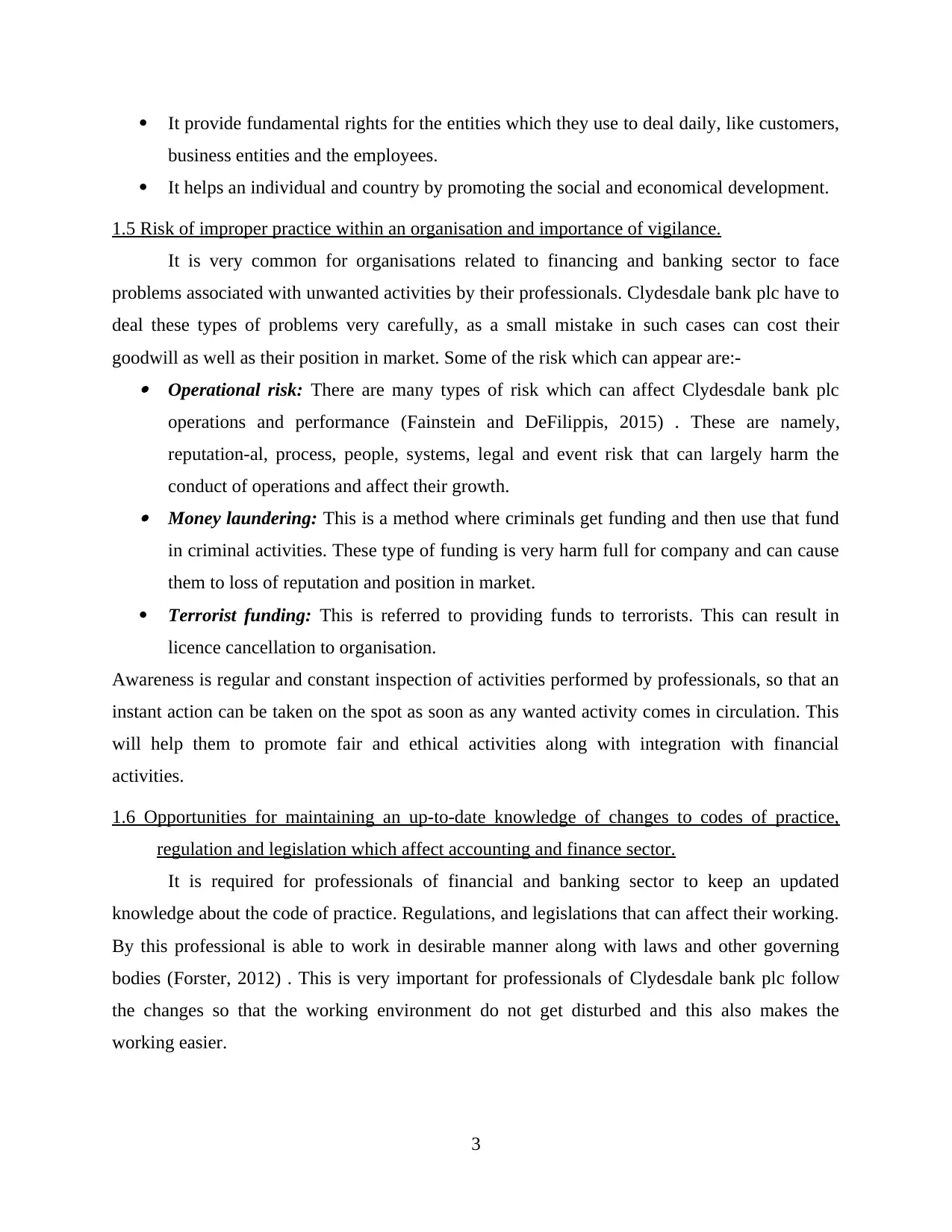
It provide fundamental rights for the entities which they use to deal daily, like customers,
business entities and the employees.
It helps an individual and country by promoting the social and economical development.
1.5 Risk of improper practice within an organisation and importance of vigilance.
It is very common for organisations related to financing and banking sector to face
problems associated with unwanted activities by their professionals. Clydesdale bank plc have to
deal these types of problems very carefully, as a small mistake in such cases can cost their
goodwill as well as their position in market. Some of the risk which can appear are:- Operational risk: There are many types of risk which can affect Clydesdale bank plc
operations and performance (Fainstein and DeFilippis, 2015) . These are namely,
reputation-al, process, people, systems, legal and event risk that can largely harm the
conduct of operations and affect their growth. Money laundering: This is a method where criminals get funding and then use that fund
in criminal activities. These type of funding is very harm full for company and can cause
them to loss of reputation and position in market.
Terrorist funding: This is referred to providing funds to terrorists. This can result in
licence cancellation to organisation.
Awareness is regular and constant inspection of activities performed by professionals, so that an
instant action can be taken on the spot as soon as any wanted activity comes in circulation. This
will help them to promote fair and ethical activities along with integration with financial
activities.
1.6 Opportunities for maintaining an up-to-date knowledge of changes to codes of practice,
regulation and legislation which affect accounting and finance sector.
It is required for professionals of financial and banking sector to keep an updated
knowledge about the code of practice. Regulations, and legislations that can affect their working.
By this professional is able to work in desirable manner along with laws and other governing
bodies (Forster, 2012) . This is very important for professionals of Clydesdale bank plc follow
the changes so that the working environment do not get disturbed and this also makes the
working easier.
3
business entities and the employees.
It helps an individual and country by promoting the social and economical development.
1.5 Risk of improper practice within an organisation and importance of vigilance.
It is very common for organisations related to financing and banking sector to face
problems associated with unwanted activities by their professionals. Clydesdale bank plc have to
deal these types of problems very carefully, as a small mistake in such cases can cost their
goodwill as well as their position in market. Some of the risk which can appear are:- Operational risk: There are many types of risk which can affect Clydesdale bank plc
operations and performance (Fainstein and DeFilippis, 2015) . These are namely,
reputation-al, process, people, systems, legal and event risk that can largely harm the
conduct of operations and affect their growth. Money laundering: This is a method where criminals get funding and then use that fund
in criminal activities. These type of funding is very harm full for company and can cause
them to loss of reputation and position in market.
Terrorist funding: This is referred to providing funds to terrorists. This can result in
licence cancellation to organisation.
Awareness is regular and constant inspection of activities performed by professionals, so that an
instant action can be taken on the spot as soon as any wanted activity comes in circulation. This
will help them to promote fair and ethical activities along with integration with financial
activities.
1.6 Opportunities for maintaining an up-to-date knowledge of changes to codes of practice,
regulation and legislation which affect accounting and finance sector.
It is required for professionals of financial and banking sector to keep an updated
knowledge about the code of practice. Regulations, and legislations that can affect their working.
By this professional is able to work in desirable manner along with laws and other governing
bodies (Forster, 2012) . This is very important for professionals of Clydesdale bank plc follow
the changes so that the working environment do not get disturbed and this also makes the
working easier.
3
⊘ This is a preview!⊘
Do you want full access?
Subscribe today to unlock all pages.

Trusted by 1+ million students worldwide
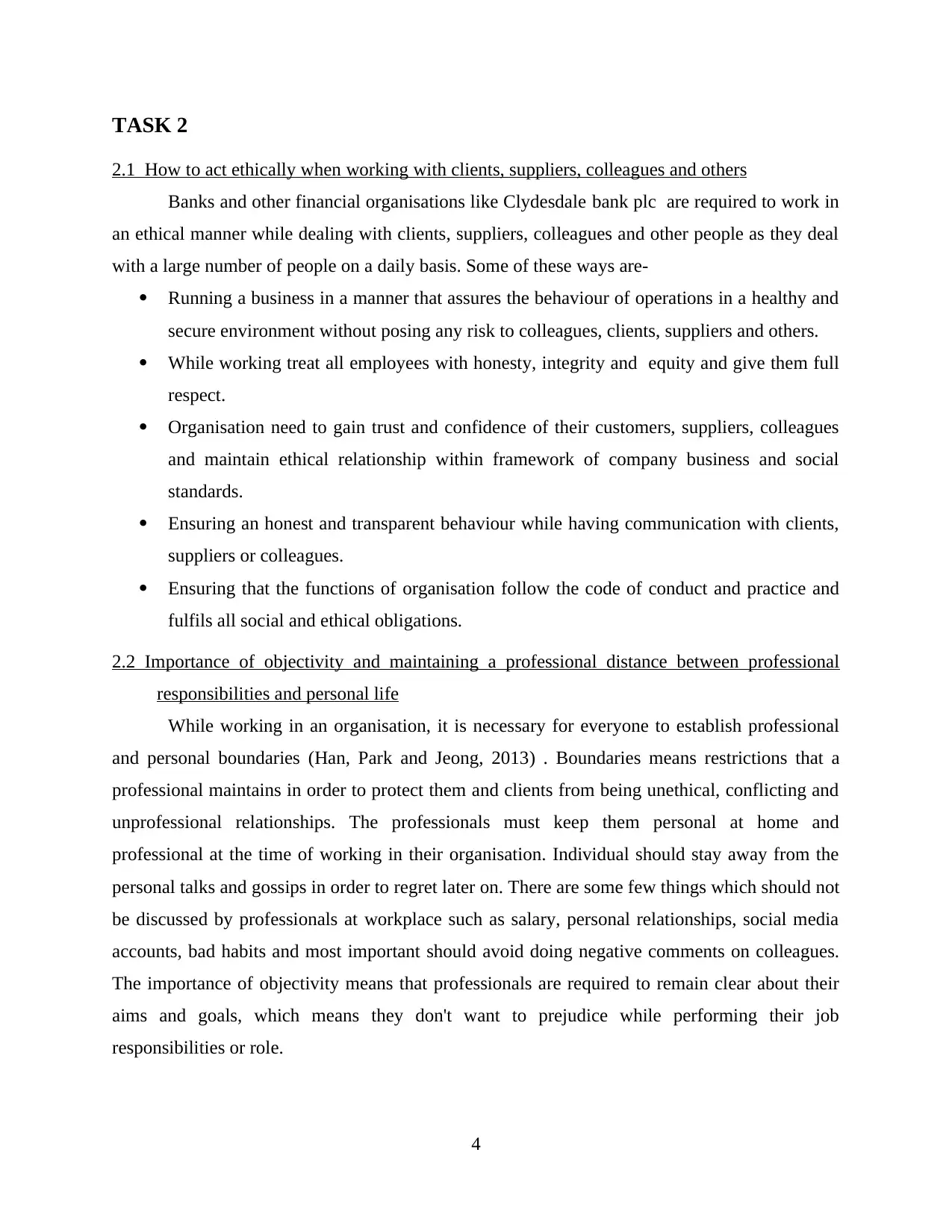
TASK 2
2.1 How to act ethically when working with clients, suppliers, colleagues and others
Banks and other financial organisations like Clydesdale bank plc are required to work in
an ethical manner while dealing with clients, suppliers, colleagues and other people as they deal
with a large number of people on a daily basis. Some of these ways are-
Running a business in a manner that assures the behaviour of operations in a healthy and
secure environment without posing any risk to colleagues, clients, suppliers and others.
While working treat all employees with honesty, integrity and equity and give them full
respect.
Organisation need to gain trust and confidence of their customers, suppliers, colleagues
and maintain ethical relationship within framework of company business and social
standards.
Ensuring an honest and transparent behaviour while having communication with clients,
suppliers or colleagues.
Ensuring that the functions of organisation follow the code of conduct and practice and
fulfils all social and ethical obligations.
2.2 Importance of objectivity and maintaining a professional distance between professional
responsibilities and personal life
While working in an organisation, it is necessary for everyone to establish professional
and personal boundaries (Han, Park and Jeong, 2013) . Boundaries means restrictions that a
professional maintains in order to protect them and clients from being unethical, conflicting and
unprofessional relationships. The professionals must keep them personal at home and
professional at the time of working in their organisation. Individual should stay away from the
personal talks and gossips in order to regret later on. There are some few things which should not
be discussed by professionals at workplace such as salary, personal relationships, social media
accounts, bad habits and most important should avoid doing negative comments on colleagues.
The importance of objectivity means that professionals are required to remain clear about their
aims and goals, which means they don't want to prejudice while performing their job
responsibilities or role.
4
2.1 How to act ethically when working with clients, suppliers, colleagues and others
Banks and other financial organisations like Clydesdale bank plc are required to work in
an ethical manner while dealing with clients, suppliers, colleagues and other people as they deal
with a large number of people on a daily basis. Some of these ways are-
Running a business in a manner that assures the behaviour of operations in a healthy and
secure environment without posing any risk to colleagues, clients, suppliers and others.
While working treat all employees with honesty, integrity and equity and give them full
respect.
Organisation need to gain trust and confidence of their customers, suppliers, colleagues
and maintain ethical relationship within framework of company business and social
standards.
Ensuring an honest and transparent behaviour while having communication with clients,
suppliers or colleagues.
Ensuring that the functions of organisation follow the code of conduct and practice and
fulfils all social and ethical obligations.
2.2 Importance of objectivity and maintaining a professional distance between professional
responsibilities and personal life
While working in an organisation, it is necessary for everyone to establish professional
and personal boundaries (Han, Park and Jeong, 2013) . Boundaries means restrictions that a
professional maintains in order to protect them and clients from being unethical, conflicting and
unprofessional relationships. The professionals must keep them personal at home and
professional at the time of working in their organisation. Individual should stay away from the
personal talks and gossips in order to regret later on. There are some few things which should not
be discussed by professionals at workplace such as salary, personal relationships, social media
accounts, bad habits and most important should avoid doing negative comments on colleagues.
The importance of objectivity means that professionals are required to remain clear about their
aims and goals, which means they don't want to prejudice while performing their job
responsibilities or role.
4
Paraphrase This Document
Need a fresh take? Get an instant paraphrase of this document with our AI Paraphraser
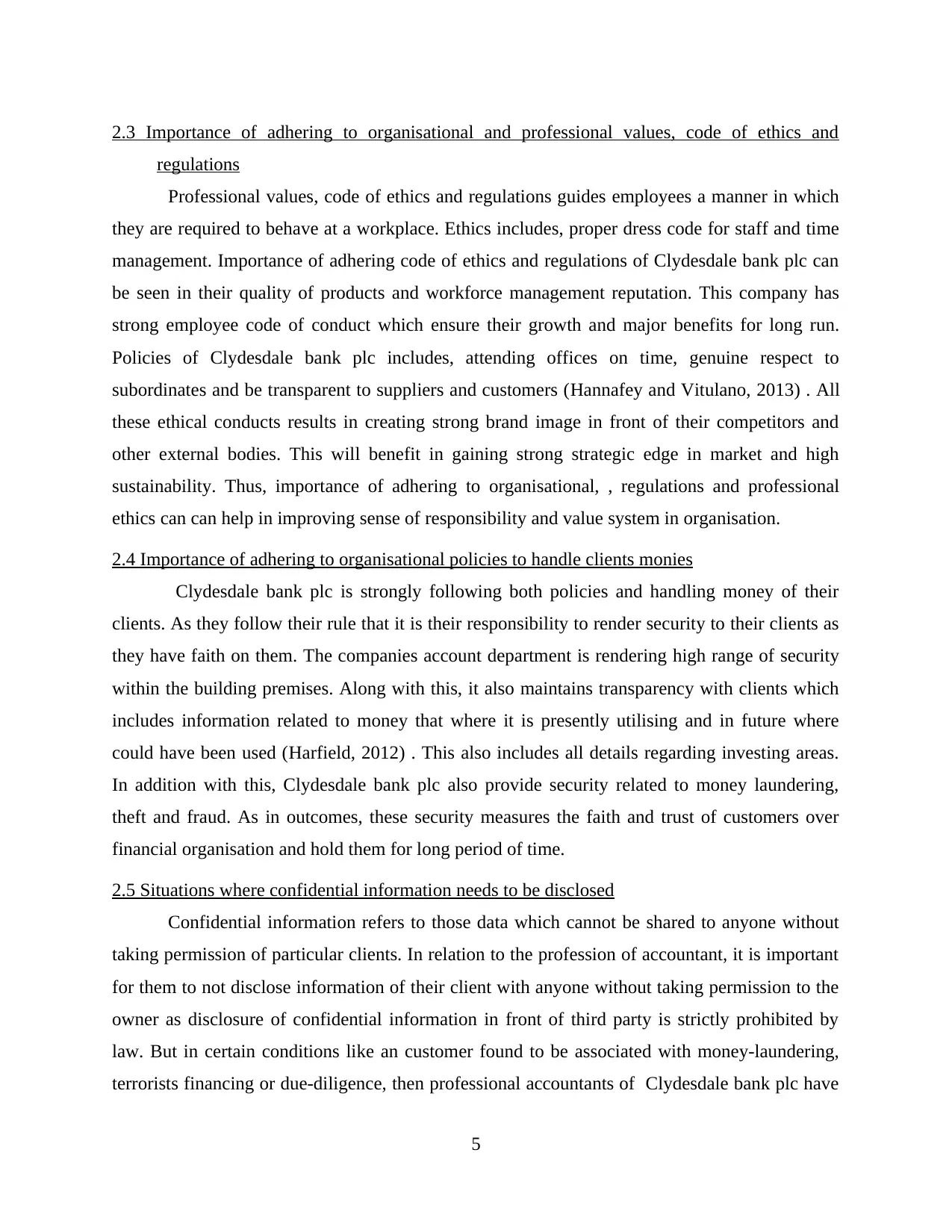
2.3 Importance of adhering to organisational and professional values, code of ethics and
regulations
Professional values, code of ethics and regulations guides employees a manner in which
they are required to behave at a workplace. Ethics includes, proper dress code for staff and time
management. Importance of adhering code of ethics and regulations of Clydesdale bank plc can
be seen in their quality of products and workforce management reputation. This company has
strong employee code of conduct which ensure their growth and major benefits for long run.
Policies of Clydesdale bank plc includes, attending offices on time, genuine respect to
subordinates and be transparent to suppliers and customers (Hannafey and Vitulano, 2013) . All
these ethical conducts results in creating strong brand image in front of their competitors and
other external bodies. This will benefit in gaining strong strategic edge in market and high
sustainability. Thus, importance of adhering to organisational, , regulations and professional
ethics can can help in improving sense of responsibility and value system in organisation.
2.4 Importance of adhering to organisational policies to handle clients monies
Clydesdale bank plc is strongly following both policies and handling money of their
clients. As they follow their rule that it is their responsibility to render security to their clients as
they have faith on them. The companies account department is rendering high range of security
within the building premises. Along with this, it also maintains transparency with clients which
includes information related to money that where it is presently utilising and in future where
could have been used (Harfield, 2012) . This also includes all details regarding investing areas.
In addition with this, Clydesdale bank plc also provide security related to money laundering,
theft and fraud. As in outcomes, these security measures the faith and trust of customers over
financial organisation and hold them for long period of time.
2.5 Situations where confidential information needs to be disclosed
Confidential information refers to those data which cannot be shared to anyone without
taking permission of particular clients. In relation to the profession of accountant, it is important
for them to not disclose information of their client with anyone without taking permission to the
owner as disclosure of confidential information in front of third party is strictly prohibited by
law. But in certain conditions like an customer found to be associated with money-laundering,
terrorists financing or due-diligence, then professional accountants of Clydesdale bank plc have
5
regulations
Professional values, code of ethics and regulations guides employees a manner in which
they are required to behave at a workplace. Ethics includes, proper dress code for staff and time
management. Importance of adhering code of ethics and regulations of Clydesdale bank plc can
be seen in their quality of products and workforce management reputation. This company has
strong employee code of conduct which ensure their growth and major benefits for long run.
Policies of Clydesdale bank plc includes, attending offices on time, genuine respect to
subordinates and be transparent to suppliers and customers (Hannafey and Vitulano, 2013) . All
these ethical conducts results in creating strong brand image in front of their competitors and
other external bodies. This will benefit in gaining strong strategic edge in market and high
sustainability. Thus, importance of adhering to organisational, , regulations and professional
ethics can can help in improving sense of responsibility and value system in organisation.
2.4 Importance of adhering to organisational policies to handle clients monies
Clydesdale bank plc is strongly following both policies and handling money of their
clients. As they follow their rule that it is their responsibility to render security to their clients as
they have faith on them. The companies account department is rendering high range of security
within the building premises. Along with this, it also maintains transparency with clients which
includes information related to money that where it is presently utilising and in future where
could have been used (Harfield, 2012) . This also includes all details regarding investing areas.
In addition with this, Clydesdale bank plc also provide security related to money laundering,
theft and fraud. As in outcomes, these security measures the faith and trust of customers over
financial organisation and hold them for long period of time.
2.5 Situations where confidential information needs to be disclosed
Confidential information refers to those data which cannot be shared to anyone without
taking permission of particular clients. In relation to the profession of accountant, it is important
for them to not disclose information of their client with anyone without taking permission to the
owner as disclosure of confidential information in front of third party is strictly prohibited by
law. But in certain conditions like an customer found to be associated with money-laundering,
terrorists financing or due-diligence, then professional accountants of Clydesdale bank plc have
5
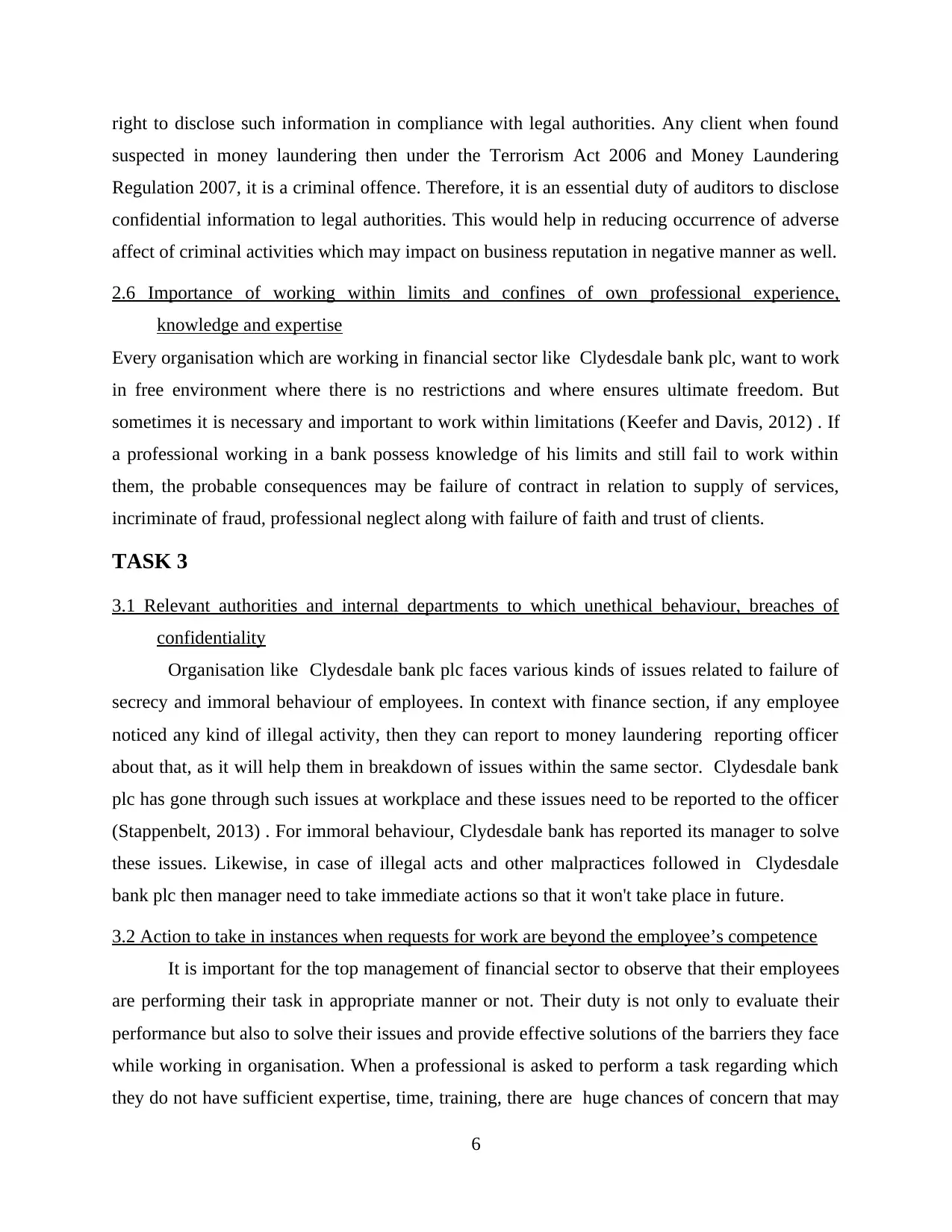
right to disclose such information in compliance with legal authorities. Any client when found
suspected in money laundering then under the Terrorism Act 2006 and Money Laundering
Regulation 2007, it is a criminal offence. Therefore, it is an essential duty of auditors to disclose
confidential information to legal authorities. This would help in reducing occurrence of adverse
affect of criminal activities which may impact on business reputation in negative manner as well.
2.6 Importance of working within limits and confines of own professional experience,
knowledge and expertise
Every organisation which are working in financial sector like Clydesdale bank plc, want to work
in free environment where there is no restrictions and where ensures ultimate freedom. But
sometimes it is necessary and important to work within limitations (Keefer and Davis, 2012) . If
a professional working in a bank possess knowledge of his limits and still fail to work within
them, the probable consequences may be failure of contract in relation to supply of services,
incriminate of fraud, professional neglect along with failure of faith and trust of clients.
TASK 3
3.1 Relevant authorities and internal departments to which unethical behaviour, breaches of
confidentiality
Organisation like Clydesdale bank plc faces various kinds of issues related to failure of
secrecy and immoral behaviour of employees. In context with finance section, if any employee
noticed any kind of illegal activity, then they can report to money laundering reporting officer
about that, as it will help them in breakdown of issues within the same sector. Clydesdale bank
plc has gone through such issues at workplace and these issues need to be reported to the officer
(Stappenbelt, 2013) . For immoral behaviour, Clydesdale bank has reported its manager to solve
these issues. Likewise, in case of illegal acts and other malpractices followed in Clydesdale
bank plc then manager need to take immediate actions so that it won't take place in future.
3.2 Action to take in instances when requests for work are beyond the employee’s competence
It is important for the top management of financial sector to observe that their employees
are performing their task in appropriate manner or not. Their duty is not only to evaluate their
performance but also to solve their issues and provide effective solutions of the barriers they face
while working in organisation. When a professional is asked to perform a task regarding which
they do not have sufficient expertise, time, training, there are huge chances of concern that may
6
suspected in money laundering then under the Terrorism Act 2006 and Money Laundering
Regulation 2007, it is a criminal offence. Therefore, it is an essential duty of auditors to disclose
confidential information to legal authorities. This would help in reducing occurrence of adverse
affect of criminal activities which may impact on business reputation in negative manner as well.
2.6 Importance of working within limits and confines of own professional experience,
knowledge and expertise
Every organisation which are working in financial sector like Clydesdale bank plc, want to work
in free environment where there is no restrictions and where ensures ultimate freedom. But
sometimes it is necessary and important to work within limitations (Keefer and Davis, 2012) . If
a professional working in a bank possess knowledge of his limits and still fail to work within
them, the probable consequences may be failure of contract in relation to supply of services,
incriminate of fraud, professional neglect along with failure of faith and trust of clients.
TASK 3
3.1 Relevant authorities and internal departments to which unethical behaviour, breaches of
confidentiality
Organisation like Clydesdale bank plc faces various kinds of issues related to failure of
secrecy and immoral behaviour of employees. In context with finance section, if any employee
noticed any kind of illegal activity, then they can report to money laundering reporting officer
about that, as it will help them in breakdown of issues within the same sector. Clydesdale bank
plc has gone through such issues at workplace and these issues need to be reported to the officer
(Stappenbelt, 2013) . For immoral behaviour, Clydesdale bank has reported its manager to solve
these issues. Likewise, in case of illegal acts and other malpractices followed in Clydesdale
bank plc then manager need to take immediate actions so that it won't take place in future.
3.2 Action to take in instances when requests for work are beyond the employee’s competence
It is important for the top management of financial sector to observe that their employees
are performing their task in appropriate manner or not. Their duty is not only to evaluate their
performance but also to solve their issues and provide effective solutions of the barriers they face
while working in organisation. When a professional is asked to perform a task regarding which
they do not have sufficient expertise, time, training, there are huge chances of concern that may
6
⊘ This is a preview!⊘
Do you want full access?
Subscribe today to unlock all pages.

Trusted by 1+ million students worldwide
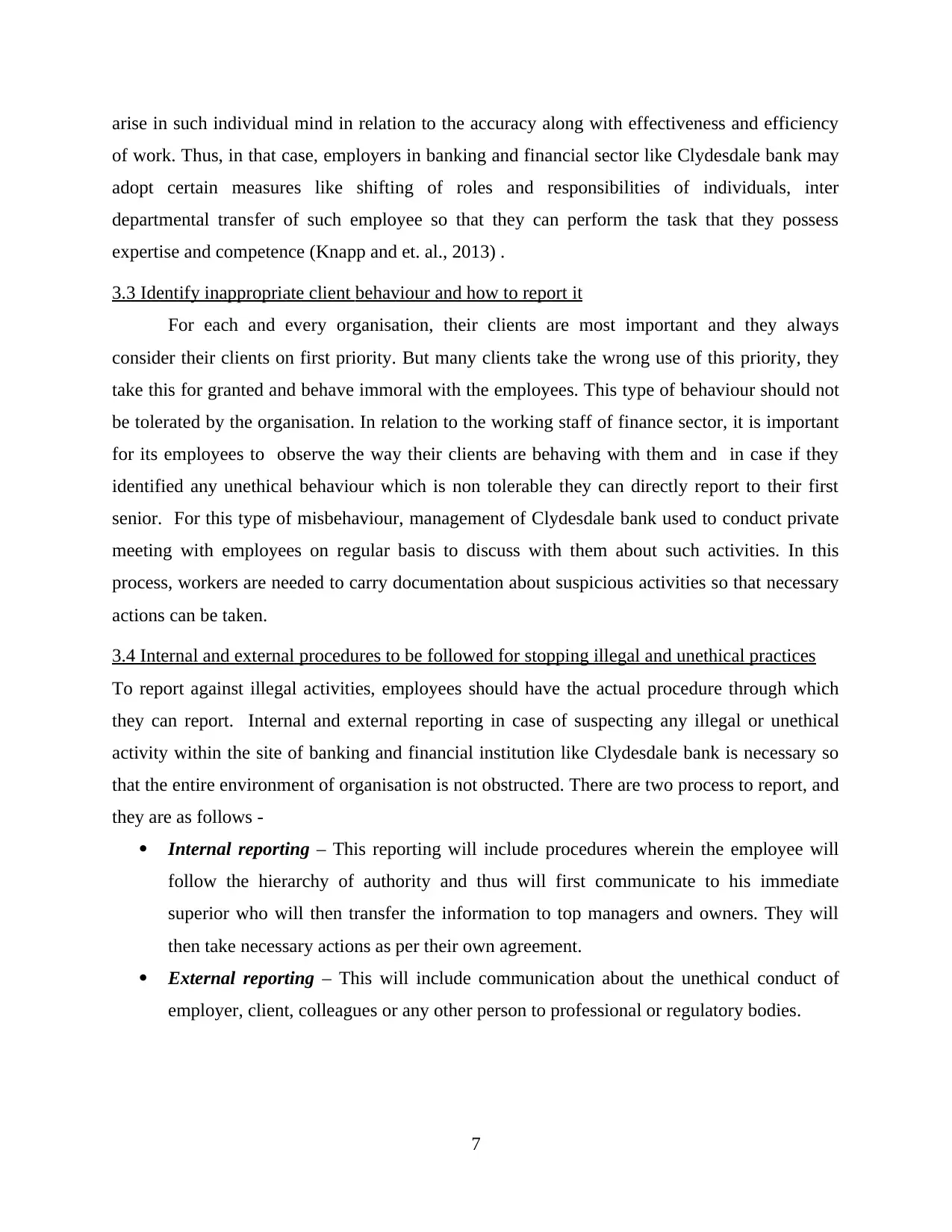
arise in such individual mind in relation to the accuracy along with effectiveness and efficiency
of work. Thus, in that case, employers in banking and financial sector like Clydesdale bank may
adopt certain measures like shifting of roles and responsibilities of individuals, inter
departmental transfer of such employee so that they can perform the task that they possess
expertise and competence (Knapp and et. al., 2013) .
3.3 Identify inappropriate client behaviour and how to report it
For each and every organisation, their clients are most important and they always
consider their clients on first priority. But many clients take the wrong use of this priority, they
take this for granted and behave immoral with the employees. This type of behaviour should not
be tolerated by the organisation. In relation to the working staff of finance sector, it is important
for its employees to observe the way their clients are behaving with them and in case if they
identified any unethical behaviour which is non tolerable they can directly report to their first
senior. For this type of misbehaviour, management of Clydesdale bank used to conduct private
meeting with employees on regular basis to discuss with them about such activities. In this
process, workers are needed to carry documentation about suspicious activities so that necessary
actions can be taken.
3.4 Internal and external procedures to be followed for stopping illegal and unethical practices
To report against illegal activities, employees should have the actual procedure through which
they can report. Internal and external reporting in case of suspecting any illegal or unethical
activity within the site of banking and financial institution like Clydesdale bank is necessary so
that the entire environment of organisation is not obstructed. There are two process to report, and
they are as follows -
Internal reporting – This reporting will include procedures wherein the employee will
follow the hierarchy of authority and thus will first communicate to his immediate
superior who will then transfer the information to top managers and owners. They will
then take necessary actions as per their own agreement.
External reporting – This will include communication about the unethical conduct of
employer, client, colleagues or any other person to professional or regulatory bodies.
7
of work. Thus, in that case, employers in banking and financial sector like Clydesdale bank may
adopt certain measures like shifting of roles and responsibilities of individuals, inter
departmental transfer of such employee so that they can perform the task that they possess
expertise and competence (Knapp and et. al., 2013) .
3.3 Identify inappropriate client behaviour and how to report it
For each and every organisation, their clients are most important and they always
consider their clients on first priority. But many clients take the wrong use of this priority, they
take this for granted and behave immoral with the employees. This type of behaviour should not
be tolerated by the organisation. In relation to the working staff of finance sector, it is important
for its employees to observe the way their clients are behaving with them and in case if they
identified any unethical behaviour which is non tolerable they can directly report to their first
senior. For this type of misbehaviour, management of Clydesdale bank used to conduct private
meeting with employees on regular basis to discuss with them about such activities. In this
process, workers are needed to carry documentation about suspicious activities so that necessary
actions can be taken.
3.4 Internal and external procedures to be followed for stopping illegal and unethical practices
To report against illegal activities, employees should have the actual procedure through which
they can report. Internal and external reporting in case of suspecting any illegal or unethical
activity within the site of banking and financial institution like Clydesdale bank is necessary so
that the entire environment of organisation is not obstructed. There are two process to report, and
they are as follows -
Internal reporting – This reporting will include procedures wherein the employee will
follow the hierarchy of authority and thus will first communicate to his immediate
superior who will then transfer the information to top managers and owners. They will
then take necessary actions as per their own agreement.
External reporting – This will include communication about the unethical conduct of
employer, client, colleagues or any other person to professional or regulatory bodies.
7
Paraphrase This Document
Need a fresh take? Get an instant paraphrase of this document with our AI Paraphraser
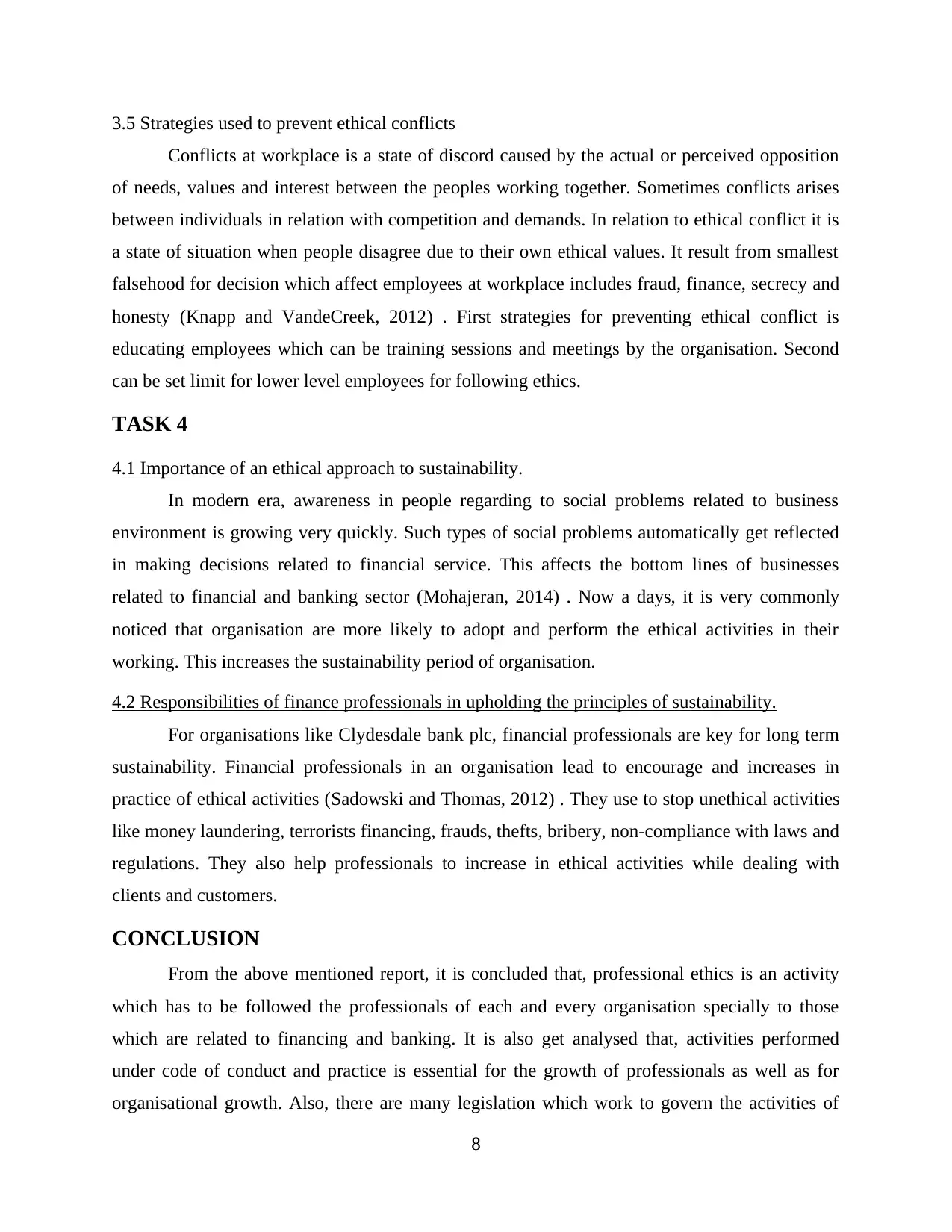
3.5 Strategies used to prevent ethical conflicts
Conflicts at workplace is a state of discord caused by the actual or perceived opposition
of needs, values and interest between the peoples working together. Sometimes conflicts arises
between individuals in relation with competition and demands. In relation to ethical conflict it is
a state of situation when people disagree due to their own ethical values. It result from smallest
falsehood for decision which affect employees at workplace includes fraud, finance, secrecy and
honesty (Knapp and VandeCreek, 2012) . First strategies for preventing ethical conflict is
educating employees which can be training sessions and meetings by the organisation. Second
can be set limit for lower level employees for following ethics.
TASK 4
4.1 Importance of an ethical approach to sustainability.
In modern era, awareness in people regarding to social problems related to business
environment is growing very quickly. Such types of social problems automatically get reflected
in making decisions related to financial service. This affects the bottom lines of businesses
related to financial and banking sector (Mohajeran, 2014) . Now a days, it is very commonly
noticed that organisation are more likely to adopt and perform the ethical activities in their
working. This increases the sustainability period of organisation.
4.2 Responsibilities of finance professionals in upholding the principles of sustainability.
For organisations like Clydesdale bank plc, financial professionals are key for long term
sustainability. Financial professionals in an organisation lead to encourage and increases in
practice of ethical activities (Sadowski and Thomas, 2012) . They use to stop unethical activities
like money laundering, terrorists financing, frauds, thefts, bribery, non-compliance with laws and
regulations. They also help professionals to increase in ethical activities while dealing with
clients and customers.
CONCLUSION
From the above mentioned report, it is concluded that, professional ethics is an activity
which has to be followed the professionals of each and every organisation specially to those
which are related to financing and banking. It is also get analysed that, activities performed
under code of conduct and practice is essential for the growth of professionals as well as for
organisational growth. Also, there are many legislation which work to govern the activities of
8
Conflicts at workplace is a state of discord caused by the actual or perceived opposition
of needs, values and interest between the peoples working together. Sometimes conflicts arises
between individuals in relation with competition and demands. In relation to ethical conflict it is
a state of situation when people disagree due to their own ethical values. It result from smallest
falsehood for decision which affect employees at workplace includes fraud, finance, secrecy and
honesty (Knapp and VandeCreek, 2012) . First strategies for preventing ethical conflict is
educating employees which can be training sessions and meetings by the organisation. Second
can be set limit for lower level employees for following ethics.
TASK 4
4.1 Importance of an ethical approach to sustainability.
In modern era, awareness in people regarding to social problems related to business
environment is growing very quickly. Such types of social problems automatically get reflected
in making decisions related to financial service. This affects the bottom lines of businesses
related to financial and banking sector (Mohajeran, 2014) . Now a days, it is very commonly
noticed that organisation are more likely to adopt and perform the ethical activities in their
working. This increases the sustainability period of organisation.
4.2 Responsibilities of finance professionals in upholding the principles of sustainability.
For organisations like Clydesdale bank plc, financial professionals are key for long term
sustainability. Financial professionals in an organisation lead to encourage and increases in
practice of ethical activities (Sadowski and Thomas, 2012) . They use to stop unethical activities
like money laundering, terrorists financing, frauds, thefts, bribery, non-compliance with laws and
regulations. They also help professionals to increase in ethical activities while dealing with
clients and customers.
CONCLUSION
From the above mentioned report, it is concluded that, professional ethics is an activity
which has to be followed the professionals of each and every organisation specially to those
which are related to financing and banking. It is also get analysed that, activities performed
under code of conduct and practice is essential for the growth of professionals as well as for
organisational growth. Also, there are many legislation which work to govern the activities of
8
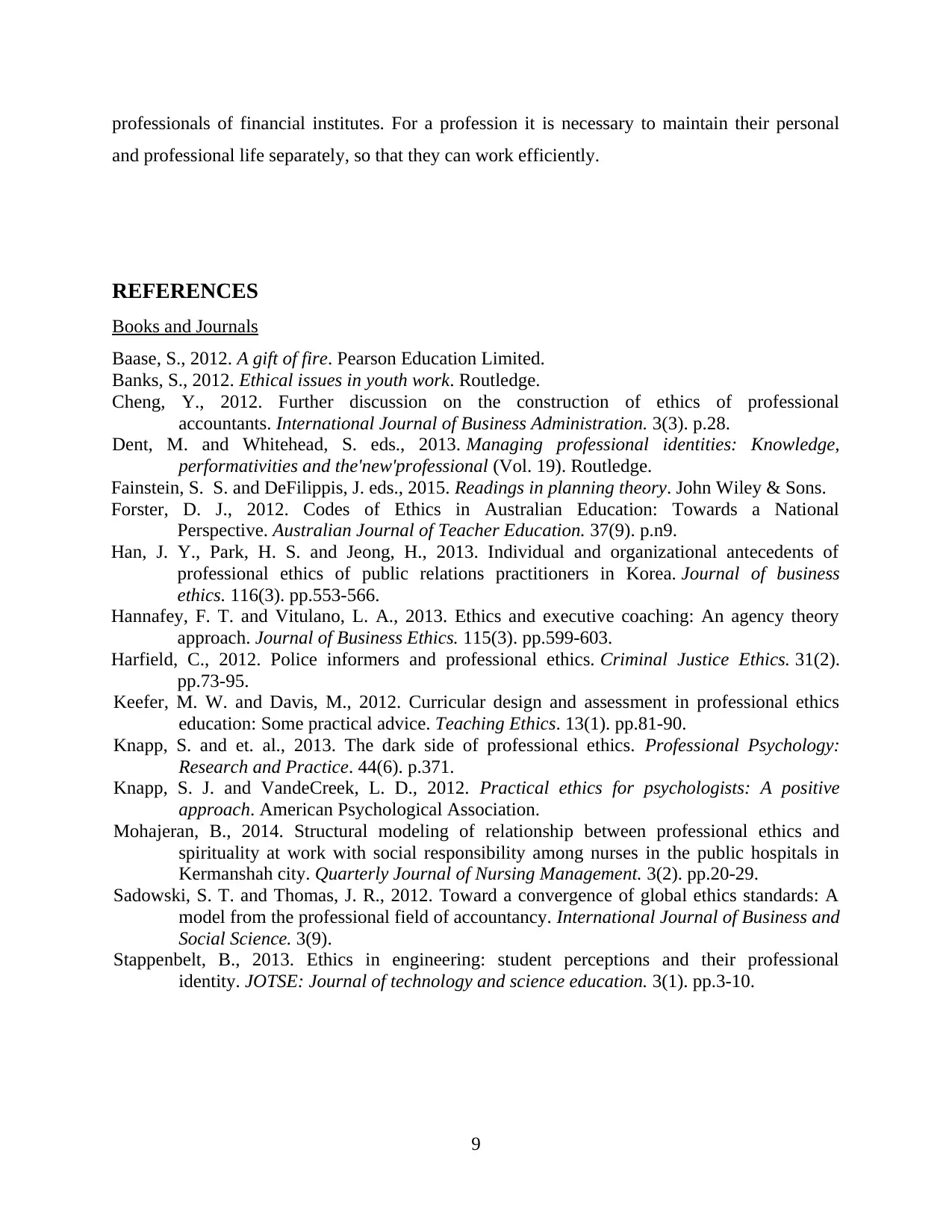
professionals of financial institutes. For a profession it is necessary to maintain their personal
and professional life separately, so that they can work efficiently.
REFERENCES
Books and Journals
Baase, S., 2012. A gift of fire. Pearson Education Limited.
Banks, S., 2012. Ethical issues in youth work. Routledge.
Cheng, Y., 2012. Further discussion on the construction of ethics of professional
accountants. International Journal of Business Administration. 3(3). p.28.
Dent, M. and Whitehead, S. eds., 2013. Managing professional identities: Knowledge,
performativities and the'new'professional (Vol. 19). Routledge.
Fainstein, S. S. and DeFilippis, J. eds., 2015. Readings in planning theory. John Wiley & Sons.
Forster, D. J., 2012. Codes of Ethics in Australian Education: Towards a National
Perspective. Australian Journal of Teacher Education. 37(9). p.n9.
Han, J. Y., Park, H. S. and Jeong, H., 2013. Individual and organizational antecedents of
professional ethics of public relations practitioners in Korea. Journal of business
ethics. 116(3). pp.553-566.
Hannafey, F. T. and Vitulano, L. A., 2013. Ethics and executive coaching: An agency theory
approach. Journal of Business Ethics. 115(3). pp.599-603.
Harfield, C., 2012. Police informers and professional ethics. Criminal Justice Ethics. 31(2).
pp.73-95.
Keefer, M. W. and Davis, M., 2012. Curricular design and assessment in professional ethics
education: Some practical advice. Teaching Ethics. 13(1). pp.81-90.
Knapp, S. and et. al., 2013. The dark side of professional ethics. Professional Psychology:
Research and Practice. 44(6). p.371.
Knapp, S. J. and VandeCreek, L. D., 2012. Practical ethics for psychologists: A positive
approach. American Psychological Association.
Mohajeran, B., 2014. Structural modeling of relationship between professional ethics and
spirituality at work with social responsibility among nurses in the public hospitals in
Kermanshah city. Quarterly Journal of Nursing Management. 3(2). pp.20-29.
Sadowski, S. T. and Thomas, J. R., 2012. Toward a convergence of global ethics standards: A
model from the professional field of accountancy. International Journal of Business and
Social Science. 3(9).
Stappenbelt, B., 2013. Ethics in engineering: student perceptions and their professional
identity. JOTSE: Journal of technology and science education. 3(1). pp.3-10.
9
and professional life separately, so that they can work efficiently.
REFERENCES
Books and Journals
Baase, S., 2012. A gift of fire. Pearson Education Limited.
Banks, S., 2012. Ethical issues in youth work. Routledge.
Cheng, Y., 2012. Further discussion on the construction of ethics of professional
accountants. International Journal of Business Administration. 3(3). p.28.
Dent, M. and Whitehead, S. eds., 2013. Managing professional identities: Knowledge,
performativities and the'new'professional (Vol. 19). Routledge.
Fainstein, S. S. and DeFilippis, J. eds., 2015. Readings in planning theory. John Wiley & Sons.
Forster, D. J., 2012. Codes of Ethics in Australian Education: Towards a National
Perspective. Australian Journal of Teacher Education. 37(9). p.n9.
Han, J. Y., Park, H. S. and Jeong, H., 2013. Individual and organizational antecedents of
professional ethics of public relations practitioners in Korea. Journal of business
ethics. 116(3). pp.553-566.
Hannafey, F. T. and Vitulano, L. A., 2013. Ethics and executive coaching: An agency theory
approach. Journal of Business Ethics. 115(3). pp.599-603.
Harfield, C., 2012. Police informers and professional ethics. Criminal Justice Ethics. 31(2).
pp.73-95.
Keefer, M. W. and Davis, M., 2012. Curricular design and assessment in professional ethics
education: Some practical advice. Teaching Ethics. 13(1). pp.81-90.
Knapp, S. and et. al., 2013. The dark side of professional ethics. Professional Psychology:
Research and Practice. 44(6). p.371.
Knapp, S. J. and VandeCreek, L. D., 2012. Practical ethics for psychologists: A positive
approach. American Psychological Association.
Mohajeran, B., 2014. Structural modeling of relationship between professional ethics and
spirituality at work with social responsibility among nurses in the public hospitals in
Kermanshah city. Quarterly Journal of Nursing Management. 3(2). pp.20-29.
Sadowski, S. T. and Thomas, J. R., 2012. Toward a convergence of global ethics standards: A
model from the professional field of accountancy. International Journal of Business and
Social Science. 3(9).
Stappenbelt, B., 2013. Ethics in engineering: student perceptions and their professional
identity. JOTSE: Journal of technology and science education. 3(1). pp.3-10.
9
⊘ This is a preview!⊘
Do you want full access?
Subscribe today to unlock all pages.

Trusted by 1+ million students worldwide
1 out of 12
Related Documents
Your All-in-One AI-Powered Toolkit for Academic Success.
+13062052269
info@desklib.com
Available 24*7 on WhatsApp / Email
![[object Object]](/_next/static/media/star-bottom.7253800d.svg)
Unlock your academic potential
Copyright © 2020–2026 A2Z Services. All Rights Reserved. Developed and managed by ZUCOL.





